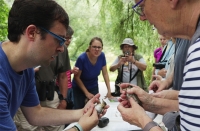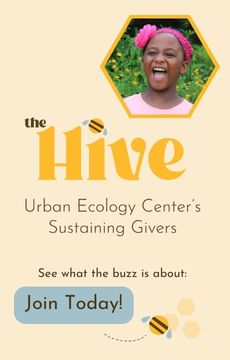Thirteen years ago I accepted a position to lead the fairly young Citizen Science Department at the Urban Ecology Center. The Center was one of the first places in the world to have a Citizen Science department because it was a brand new field. Or was it? The reality is that we just gave a new name to a process that had been occurring for millennia – science undertaken wholly or in part by non-professional scientists (think Charles Darwin, Benjamin Franklin, Increase Lapham or any community member studying the world).
A few years after this field was named, we began to hear objections to the term Citizen in Citizen Science, particularly from communities with significant immigrant populations near the southern borders of the United States. Although the term citizen in this context was put forth with an entirely different meaning—as a civilian differentiated from academics or even as a citizen of the Earth—this was a new perspective I wanted to understand.
About 10 years ago we polled our “citizenry”, those involved with Citizen Science at the Center, and other community members not involved with the department. Feedback indicated that it didn’t seem like an important or polarizing issue so we kept the name but continued the discourse.
Over the next decade the conversation continued and opposition to the term grew. I started to feel like I was defending the use of the name even as I recognized this growing discontent. The term felt even more unwelcoming as “illegal immigration” began to dominate headlines and the fear of deportation consumed more people’s lives.
We polled our constituents again recently and received an overwhelming response in favor of coming up with a more welcoming name that didn’t alienate a segment of the community.
So I am happy to announce that the Citizen Science Department of the Urban Ecology Center is now going to be the Community Science Department. We want to emphasize that everyone in the community is encouraged to collaborate with us to perform research and monitoring, whether it’s learning how to survey for wildlife, managing and analyzing data or carrying out original research.We are also not the first to make this change but are joining other groups, such as Public Lab.
Public Lab, an organization founded by former UEC intern Shannon Dosemagen, focuses on creating deep collaborative networks guided by the questions and goals of all people involved in a project. They define community science as collaboratively-led scientific investigation, exploration and engagement in the entirety of the scientific process.
Old habits die hard and you will likely still hear us using the term Citizen Science. But over the coming year you will see us roll out the change—from our website and annual reports to the sign over the door to Citizen Science Lab at Riverside Park. Whether you’ve put in hundreds of hours over the years or you’re hearing about our department for the first time, I encourage you to come on a snake survey, work with Young Scientists or participate in the inaugural Brew City Birding Festival. Our collaborative work keeps getting better and better because of the talents and passion of our amazing community of Land Stewards, Volunteers, Community Programs, Visitors Service, schools, summer camps and our advisory groups.





